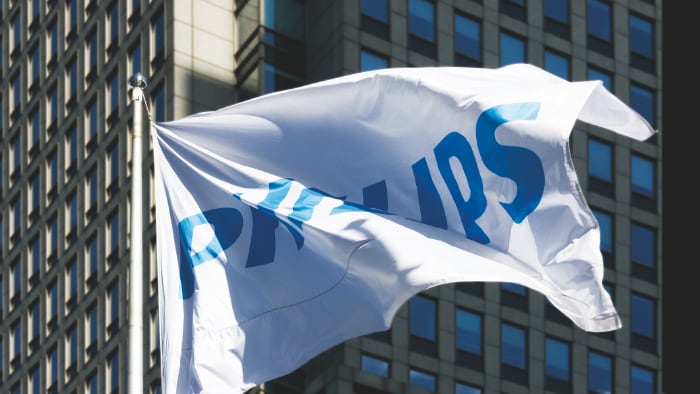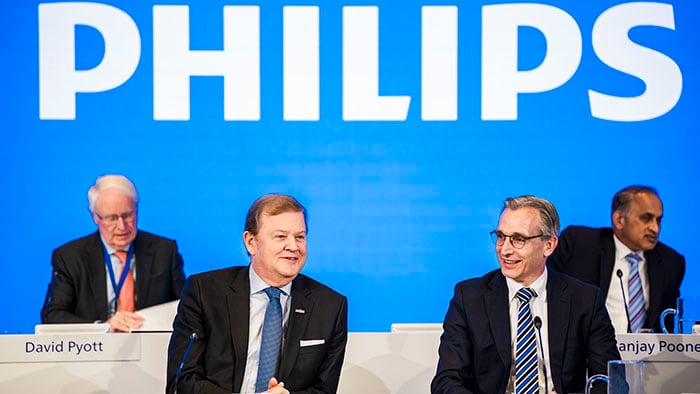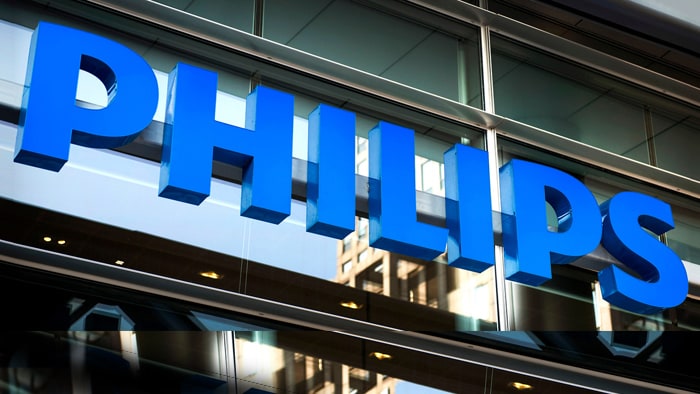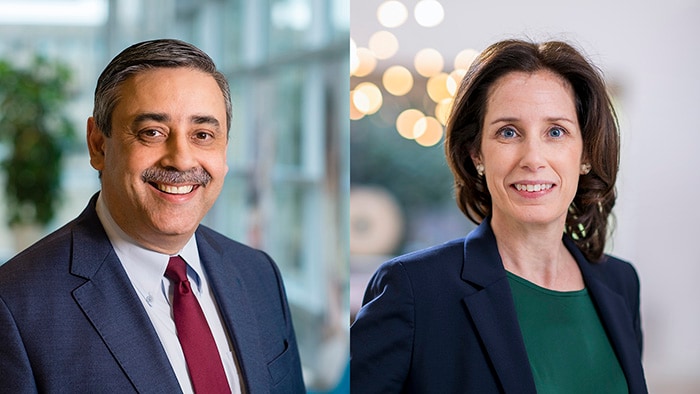Spoken word prevails
Introduction
Ladies and Gentlemen, welcome to the 2020 Annual General Meeting of Royal Philips. This is obviously not the setting we are used to, but I am again honored to update you today on the progress we are making - together with our 80,000 employees - to make the world healthier and more sustainable through innovation. The COVID-19 pandemic is having an unprecedented impact on people, on society and the economy. That makes our mission more relevant than ever. Our employees are highly motivated, and we take great strength in the work we are doing to support hospitals, medical staff, and the growing number of critically ill patients. It’s a top priority for all of us at Philips. Over the next 15 minutes, I would like to outline Philips’ transformation and purpose, zoom in on our financial performance, elaborate on the unprecedented impact of the COVID-19 outbreak, discuss the road ahead for Philips and I will conclude with our capital allocation policy and key takeaways.
Innovating with purpose
When we started our transformation in 2011, our aim was to make sure that Philips stayed relevant - that we could apply our tremendous innovation strength to make a difference to people’s lives. In the years that followed, we sharpened our focus on health technology, enabling us to deliver today’s portfolio of integrated solutions to help people to stay healthy and prevent disease, to give clinicians the tools to make precision diagnoses, deliver minimally-invasive treatments and provide better patient care, to deliver care outside the hospital, and help people to live with chronic conditions at home. We have significantly invested in informatics, Artificial Intelligence and the Cloud, helping care providers to access the right data, at the right time, for the right patient. It is already allowing care processes to be more personalized, to become seamlessly integrated and hence more efficient and effective. Our 1.9 billion euro R&D program has been key to these transformational solutions. And to ensure that our innovations have maximum impact, we apply what is called the Quadruple Aim of healthcare to all our development choices. This performance metric focuses on the simultaneous improvement of patient experiences, health outcomes, and staff satisfaction, while lowering the cost of care. A good example in the field of minimally-invasive treatment is the combination of our Azurion interventional imaging platform, our smart devices and our software solutions. Together they help clinicians to decide, guide, perform and confirm the appropriate treatment. In other words, to innovate and optimize their clinical procedures. In Connected Care, our eICU telehealth solution for intensive care units allows teams of intensivists and critical care nurses to centrally monitor patients in the ICU - a solution enabled by audiovisual technologies, data visualization, and predictive analytics. In Personal Health, our solutions support healthy lifestyles, helping consumers manage their health with actionable insights, coaching and support from care professionals. For example, with our Sonicare toothbrush and app, people can manage their daily oral care habits. We have added the Teledentistry service for remote dental assessments by licensed dentists. As a purpose-led company, we have made sustainability a cornerstone of the way that we do business. We are contributing to the United Nations’ Sustainable Development Goals, in particular SDG 3 access to care, SDG 12 sustainable use of materials and SDG 13 sustainable use of energy. We will be carbon-neutral in our own operations by the end of this year, with both our US and Dutch operations 100%-powered by renewable electricity. As a frontrunner in this much-needed approach to doing business, we were once again recognized in the Dow Jones Sustainability Indices list. Ladies and gentlemen, let me now move on to the 2019 results.
2019 financial performance
We delivered a robust financial performance in 2019, showing resilience in the face of significant headwinds. Driven by continued demand for our innovative products and solutions, we were able to grow our company to EUR 19.5 billion in sales with 4.5% comparable sales growth. The Adjusted EBITA margin improved by a modest 10 basis points, largely due to trade war tariff headwinds and a decline in license income, coupled with investments in growth. We ended the year with a comparable order intake that grew a further 3%, on the back of strong 10% growth in 2018, and we delivered a free cash flow of over EUR 1 billion. Last but not least, our share price rose over 40% in the course of 2019 to a 19-year high, outpacing many of our key peers. Our Diagnosis & Treatment businesses performed well, with improved revenue and earnings supported by a strong flow of innovations. In Diagnostic Imaging we finalized the revamp of our CT and MR portfolios, including the introduction of an industry-first ‘Tube for Life’ guarantee with our Incisive CT imaging platform. In Image-Guided Therapy, we further built on the Philips Azurion success story with the launch of innovations like FlexArm, which enables optimal 2D and 3D imaging across the whole patient. Our Connected Care businesses had a challenging year, despite retaining market share. Although they posted modest growth, profitability actually decreased. The fundamentals, however, remain solid, as we have seen in the past two quarters where results have already started to improve. In 2019, we introduced several innovations, such as the IntelliVue MX750 and MX850 patient monitors, which feature an extensive range of measurements and analytics, as well as new cybersecurity features. The Personal Health businesses rebounded strongly from a slower 2018, with higher revenue and earnings driven largely by the performance of our Oral Healthcare and Personal Care businesses. A notable highlight of the year was the further roll out of our new smart S7000 Shaver series, our first connected shaver, as well as the premium model S9000 Prestige, driving market share gains in the premium shaver market.
Combatting COVID-19
As I said earlier, with the COVID-19 outbreak our mission to improve people’s lives is more relevant than ever. We continue to focus on our triple duty of care, which are meeting critical customer needs, safeguarding the health and safety of our employees, and ensuring business continuity. We have a broad portfolio of products, services and solutions to help diagnose, treat and monitor COVID-19 patients, including diagnostic imaging systems, hospital ventilators and patient monitoring solutions, as well as hospital telehealth solutions for the intensive care unit and telehealth solutions to connect caregivers with patients at home. We are investing EUR 100 million in the steep ramp up of production, especially in ICU ventilators and monitors. This production increase enabled us to supply additional ventilators to hospitals in the most affected regions in China, southern Europe and the United States. Moreover, we plan a further fourfold production increase by the third quarter of 2020. At the same time, we have developed the new Philips Respironics E30 ventilator for emergency use when a fully featured ICU ventilator is not readily available. This ventilator is more suitable for large scale production, and we are able to produce 15,000 units per week. I am extremely proud of, and thankful for, the commitment, hard work and resourcefulness of our employees. Even though large parts of the world are on lock downs and the majority of our employees are working from home, together we have been able to keep Philips fully functioning. Let me give you a few examples. Our colleagues in Pennsylvania and California are working round the clock to produce the ventilators. Our procurement teams are working at the same pace with our global suppliers for a sufficient and uninterrupted supply of the many different components. This is the most challenging and ultimately, the rate-limiting step. Our 6,000 field service engineers go to hospitals across the world to maintain critical imaging and patient monitoring systems, ensuring continuity for hospitals. We always make sure our field service engineers have the protective equipment needed to carry out these critical tasks. I am also proud of our colleagues in the consumer side of the business, where activities have obviously slowed down. They keep that part of our company fully functioning, and are already preparing for a pick-up in demand, while also stepping in to help colleagues in the professional healthcare domain, where we are ramping up volume fast. Due to the COVID-19 outbreak, Philips’ financial performance was really a tale of two stories in the first quarter. There was increased demand for our professional healthcare products and solutions, with comparable sales and order intake growth for the Connected Care and Diagnosis & Treatment businesses. Comparable order intake grew 23%, most notably in diagnostic imaging, hospital ventilators, and patient monitors. At the same time, there was a significant decline in demand for our Personal Health portfolio and we saw Image-Guided Therapy procedures trending down as the quarter progressed. For the Philips Group, this resulted in a 2% comparable sales decrease and an Adjusted EBITA margin of 6%. Assuming that we can convert our existing order book as planned, that elective hospital procedures normalize, and consumer demand gradually improves, we aim to return to growth and improved profitability in the second half of the year. For the full 2020 year, we aim to achieve a modest comparable sales growth and Adjusted EBITA margin improvement.
Continuing the transformation
As the ongoing threat of COVID-19 accelerates the adoption of new technologies, healthcare informatics will play an ever more important role. Our transformation to a health technology company and our significant investments in informatics and data science will enable us to offer compelling solutions. As part of this ongoing effort, we are now in the process of reviewing ownership options for our Domestic Appliances business, which although significantly contributing to Philips is not a strategic fit for the future. We will reinvest the proceeds of this transaction in expanding the company’s portfolio. Following the disentanglement of Domestic Appliances, the remaining Personal Health businesses will continue to play an important role in our integrated health continuum approach, particularly in healthy living and prevention. We address the associated consumer health and well-being needs with our oral healthcare, personal care, and mother & child care offerings. With this, our ten-year portfolio transformation is nearing completion, allowing us to double down on our efforts in bringing new solutions in Diagnosis & Treatment, Connected Care and Personal Health.
Capital allocation
Now let me update you on the topic of capital allocation. Philips has a strong balance sheet and robust liquidity position, and in the first quarter we took action to further protect our liquidity in view of the possible continued impact of COVID-19 on our markets in 2020. We successfully placed 1 billion euro of notes at very attractive rates. We are keeping the size of our 1.5 billion euro share buyback program unchanged, but the remainder of the buybacks will be executed through individual forward transactions. This will optimize the number of shares to be repurchased, while maintaining our liquidity position. With regard to dividend, Philips maintains its proposed dividend of 0.85 euro per common share against the net income of 2019. However, the distribution of this dividend will be in shares only, instead of the initially proposed distribution in cash or in shares at the option of the shareholder. We plan to convene an Extraordinary General Meeting of Shareholders in June 2020, the agenda of which will include the revised proposal to declare a distribution of EUR 0.85 per common share, in shares only.
Conclusion
Looking ahead, I expect the 2020’s to be another transformational decade for healthcare. Technology will continue to play a major part. We will be focused on applying data science and precision medicine to create new innovation opportunities that address customer, consumer and patient needs. However, technology is not the major barrier for change. It is collective behavior that we must address. I am firmly convinced that COVID-19 will accelerate the broad adoption of new care models. With the large number of patients involved and the face-to-face risk of infecting other patients and staff, telehealth sometimes referred to as ‘virtual care’ can provide valuable relief to the healthcare system. I am proud that Philips remains a front-runner in this transformation. Now let me conclude. I have already thanked our employees, and I wish to also thank our customers, shareholders and other stakeholders for the support they continue to give to Philips. As I said at the start of this presentation, our mission has never been more relevant. Energized by our purpose, we will continue to build an ever brighter future as a leader in health technology. Thank you for your attention.
Share on social media
Topics
Contact

Ben Zwirs
Philips Global Press Office Tel: +31 6 1521 3446
You are about to visit a Philips global content page
Continue










